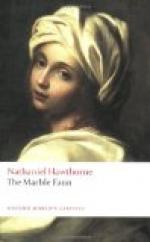“Dear me!” said Hilda, drawing imperceptibly away from her companion. “Is this the penalty of refinement? Pardon me; I do not believe it. It is because you are a sculptor, that you think nothing can be finely wrought except it be cold and hard, like the marble in which your ideas take shape. I am a painter, and know that the most delicate beauty may be softened and warmed throughout.”
“I said a foolish thing, indeed,” answered the sculptor. “It surprises me, for I might have drawn a wiser knowledge out of my own experience. It is the surest test of genuine love, that it brings back our early simplicity to the worldliest of us.”
Thus talking, they loitered slowly along beside the parapet which borders the level summit of the Pincian with its irregular sweep. At intervals they looked through the lattice-work of their thoughts at the varied prospects that lay before and beneath them.
From the terrace where they now stood there is an abrupt descent towards the Piazza del Popolo; and looking down into its broad space they beheld the tall palatial edifices, the church domes, and the ornamented gateway, which grew and were consolidated out of the thought of Michael Angelo. They saw, too, the red granite obelisk, oldest of things, even in Rome, which rises in the centre of the piazza, with a fourfold fountain at its base. All Roman works and ruins (whether of the empire, the far-off republic, or the still more distant kings) assume a transient, visionary, and impalpable character when we think that this indestructible monument supplied one of the recollections which Moses and the Israelites bore from Egypt into the desert. Perchance, on beholding the cloudy pillar and the fiery column, they whispered awestricken to one another, “In its shape it is like that old obelisk which we and our fathers have so often seen on the borders of the Nile.” And now that very obelisk, with hardly a trace of decay upon it, is the first thing that the modern traveller sees after entering the Flaminian Gate!
Lifting their eyes, Hilda and her companion gazed westward, and saw beyond the invisible Tiber the Castle of St. Angelo; that immense tomb of a pagan emperor, with the archangel at its summit.
Still farther off appeared a mighty pile of buildings, surmounted by the vast dome, which all of us have shaped and swelled outward, like a huge bubble, to the utmost Scope of our imaginations, long before we see it floating over the worship of the city. It may be most worthily seen from precisely the point where our two friends were now standing. At any nearer view the grandeur of St. Peter’s hides itself behind the immensity of its separate parts,—so that we see only the front, only the sides, only the pillared length and loftiness of the portico, and not the mighty whole. But at this distance the entire outline of the world’s cathedral, as well as that of the palace of the world’s chief priest, is taken in at once. In such remoteness,




